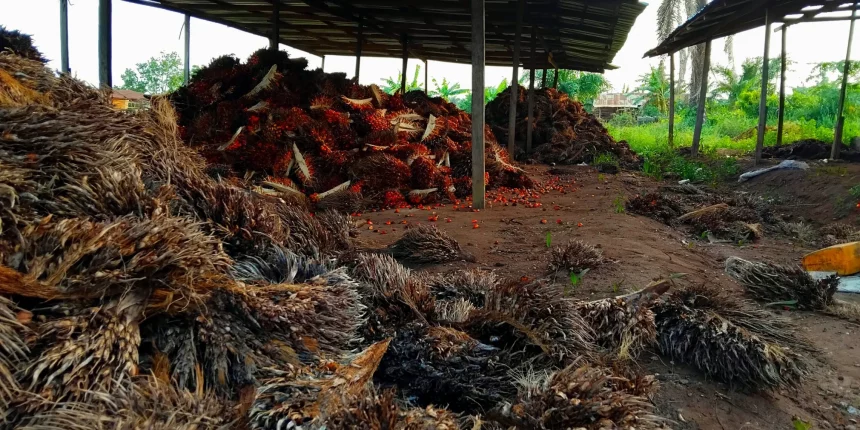Women are the leading players in the palm oil industry in Okitipupa. However, lack of access to capital constrains their trade.
On a Friday morning in May, a tired Omosehin Adekanle stared at a heap of palm kernels at her milling store in Okitipupa, a town in Ondo State, and a major palm oil-producing area in Nigeria. The 45-year-old woman had spent the night at the store with her workers ahead of a delivery deadline.
The team of workers, including six women and five men, had extracted seven oil drums (1.4 metric tonnes). However, Mrs Adekanle needed to supply 20 drums, and time was not on her side.
“Five customers are waiting for supplies from this production,” said the exhausted woman. “We worked overnight, having started by 8 a.m. yesterday. We didn’t sleep.”


Women are the main players in the palm oil industry in Okitipupa. However, lack of access to capital constrains their trade. Mrs Omosehin’s mill has only a “presser” and a “digester.” One of the machines is old and no longer efficient in extracting oil from palm kernels, forcing her to revert to traditional processing methods.
“More machines would have fastened and expanded our production, but I can’t afford them,” she said. She had no idea how to access a loan to buy the equipment needed to upgrade her mill. A consequence is the regular failure of delivery appointments.
High local demand, low production
A 2019 report by PwC revealed that Nigeria consumed approximately 1.34 million metric tonnes of palm oil in 2018, which accounted for about 44.7 per cent of the country’s total fats and oils consumption that year. This makes Nigeria the largest consumer of palm oil in Africa. As of 2023, Nigeria produced an estimated 1.4 million metric tonnes but continued to import to meet rising domestic demand, expected to reach 1.44 million metric tonnes by 2026, at an average annual growth rate of 0.7 per cent.
Recklessness and neglect

Okitipupa used to produce palm oil on an industrial scale following the establishment of the Okitipupa Oil Palm Company (OOPC) in 1968. The company had plantations in many parts of the state for palm kernels, its primary raw materials.
At its peak, the company employed 10,000 workers and was a major player in Nigeria’s palm oil industry in the 1990s. OOPC produced palm oil, palm kernel oil, and other products such as crude palm oil, technical oil, pharmaceutical stearin, palm wine, brooms, seedlings, ashes, and brown soaps.
It also produced vegetable oil and edible fat for industrial customers who made soaps, margarine, and vegetable oils.
However, the company gradually collapsed over the decades, partly due to poor management, which continued after the Ondo State Investment (Holding) Company Limited took over in 1987. The company was converted into a Public Liability Company (PLC) in 1983, though it remained under the ownership of the Ondo State Government. In 2004, the government appointed managers to prepare it for private investors. It is still undergoing restructuring and recovery efforts.
Other companies cultivating and processing oil palm in Ondo State include the Ore-Irele Oil Palm Company Ltd, which has a 3,103-hectare plantation, and the Araromi-Ayesan Oil Palm Plc, a joint venture with OOPC, which has a 10,468-hectare plantation.
These plantations now supply their raw palm kernels to other processors, including artisans such as Mrs Adekanle in Okitipupa. However, they cannot fill the void left by OOPC, which produced over 2000 metric tonnes per hour at its peak.

Red Gold Initiative
The Ondo State Government recognises the state’s vast potential in the palm oil industry. In 2021, the late former Governor Rotimi Akeredolu commissioned the Gas Inland LPG Terminal and Oil Palm Mills in the Ore Industrial Park in the Odigbo Local Government Area.
The mills were part of the Red Gold Project initiated under a partnership between the state government and the National Oil Palm Producing Association of Nigeria (NPPAN). Mr Akeredolu said the initiative would make Ondo State the largest palm oil producer in Nigeria.
Under the initiative, the government would allocate 60,000 hectares of land to agri-firms to operate large farms and create 500,000 jobs. It would also allocate N2 billion in 2022 to assist small-holder palm oil producers. The state government secured the fund under the Oil Palm Development Initiative of the Central Bank of Nigeria (CBN), which began in 2019. The bank set aside the funds to bridge the palm oil supply gap, which is estimated at 1.25 million metric tonnes annually.
Mr Akeredolu said the Ondo State AgriBusiness Empowerment Centre (OSAEC) would also provide essential services to farmers and processors under the Red Gold Initiative, including land clearing and development, machinery and equipment, shelter, basic facilities, technology, and training.
Eventually, the government allocated 70,000 hectares to six companies. JB Farms Limited got 10,000 hectares in the Oluwarotimi Forest Reserve. However, there was a problem: farmers from the Odigbo and Okitipupa local government areas had cultivated tree crops on the land for generations and kicked against their eviction from the land.
Local pushback
When SAO Agro-Allied Services Limited, another company allocated land, began work on it, angry farmers shut down the Lagos-Ore expressway to protest the alleged forceful takeover of their farms and the destruction of their tree crops.
“They seized my 14-acre oil palm farm,” Ayodele Ajibolade told PREMIUM TIMES in Okitipupa. “They did not even inform me before sending tractors to destroy my farm. It’s been over three years since the government took over my farm without compensation.”

“Many farmers have become jobless. A friend of my brother’s, Maja, died heartbroken, leaving behind five children for his wife, who has had nothing to do since they destroyed their farm. (Late former governor) Akeredolu didn’t give us anything when he took over our farms. We protested, but nothing happened.”
Some farmers claimed the government allocated land to them in another area, but said they found the government had sold the same land.
Ondo govt: “Farmers have no right on the land”
However, in an interview with PREMIUM TIMES, Rotimi Akinsola, the governor’s Senior Special Adviser on Agriculture, said the farmers had no rights on the land they were evicted from.
“You cannot go to a reserve, a gazetted land, and tell me you were there for 15 years,” Mr Akinsola said. “It’s a special land under government care. It’s supposed to be protected. You were not even supposed to go in there. If you go in there and start to plant crops, it’s illegal.”
The late Governor Akeredolu had announced in 2021 the N2 billion loan scheme for farmers and oil palm processors under the Red Gold Initiative and the provision of essential services by OSAEC. However, all the farmers and processors our reporter spoke with in Okitipupa said they had no access to them.
“We always hear about loan schemes, but we don’t see any,” Mrs Ajibolade said.
Many other farmers spoke in the same vein. “I applied and they asked us to pay some money, but in the end, we did not hear anything again,” Akinola Yasere, a farmer in Okitipupa, said.

Mr Akinsola said the Red Gold initiative’s primary goal was to attract investors.
“The Red Gold has brought investors who have the capacity to mill their oil with the latest technology, and produce better oil than our small farmers, who don’t have the technology or the equipment to do that.
“JB is building a $12 million mill in that place. Do you know what that’s going to do to the state? The number of employees? Those are the kind of investments. He has done 10 bridges and kilometres of road in that place. Can smallholder farmers do that? And we are also using them for security on the poorer side. We’re bringing the big investors to clear that place so the cattle herders will not have a place to hide,” said the governor’s aide.
When PREMIUM TIMES visited the JB Farm and Factory site in May, it was still under construction. A former worker, who requested anonymity for fear of intimidation, confirmed that the company was not yet operational.

“They have not started production. As you can see, the factory is still under construction, and they are still planting oil palms,” he said.
Poor Credit Financing: Outdated methods
In Okitipupa, local palm oil mills still use traditional methods, such as cooking the fruits with firewood, hand-washing them, and mashing them to extract palm oil.
“My presser and digester spoilt within three months, and you have to travel far to repair them,” said Smart Akinrolayo, a former Okitipupa Oil Palm Company worker who now runs an artisanal mill.
Mr Akinrolayo explained why women constitute the labour force in subsistence palm oil processing in the Okitipupa area.

“This business requires washing, filling, and cooking, which women can do better than men,“ he said.
Some women told this reporter that they suffered health challenges, including skin diseases and musculoskeletal disorders, after manually extracting oil from the kernels.
Mrs Omosehin said she was diagnosed with Musculoskeletal disorders (MSDs), which cause pain in her neck and back.
“The back pain is disturbing, but what else can I do? I have four children, all still in school. My husband is a government worker, and his salary cannot cover our needs.”
“This is common with everybody working in factories,” Funmilola Olaitan, another woman who shared her experience with PREMIUM TIMES, said.

“This work is very stressful, but we don’t have a choice. This is what supports our family.”
Industry missing institutional support – Expert
Unlike its Okitipupa counterpart, Okomu Oil Palm Company Plc has remained alive in the oil palm industry for five decades. Established by the Nigerian government in 1976 in Edo State, it became a PLC in 1990 and operates many oil palm plantations.
Its agriculture coordinator, Billy Ghansah, decried the lack of institutional support for palm oil farmers.
“There is virtually no institutional support for farmers’ efforts; NIFOR (the Nigerian Institute for Oil Palm Research) cannot provide the support that farmers need,” Mr Ghansah said.
The coordinator of one of Nigeria’s largest palm oil production industries said farmers need capacity training to improve their knowledge of oil palm cultivation.
He said the training would enhance “their record-keeping, pricing formulation, their ability to get support in terms of loans, and their ability to get good planting material in terms of inputs.”
He also stressed the need for an understanding between small-scale holders and big firms regarding land issues.
“Big companies have issues that must be sorted out, including land ownership. We in Africa have a very emotive adherence to our land. It is not easy for us to give it up. So there should be some understanding of how these things are organised because the big companies provide a source of technical support, a market for the farmers, and a catalyst for development if it’s done right.”

Why small-holder farmers can’t access loans
In a phone interview with PREMIUM TIMES, the Agribusiness Coordinator, First City Monument Bank (FCMB) Lagos Region, Taiwo Adegboyega, noted that poor financial literacy and government policy affect the potential of small-holder palm oil farmers and processors in Nigeria.

“Most don’t have their business structured away from their personal finances like a registered business. They focus on eating first; whatever remains, they cannot put back, unlike a business person who sets a target, a structure, and others. It’s part of why most banks don’t fund smallholder farmers directly.
“Another issue is collateral. The first collateral is the cash collateral, which is the cash flow. You must have a business that is generating income. The second collateral is a legal mortgage. If something happens to the business, the business can no longer repay.”
He added that commercial and microfinance banks are sceptical of issuing loans to oil palm farmers, because of the crop cycle.
“Oil palm is a bit difficult. It’s more difficult than the general smallholder farmers. Why? Because we have to consider periods, crops, and their crop cycle and gestation period. Smallholder farmers involved in grain production, maize, sorghum, and millet, have a life cycle of three months. Some of them still have microfinance that funds them. Even though they don’t have a structure, microfinance also deals with the informal sector.
“But for oil palm, you won’t see any bank, either microfinance or commercial banks, supporting small-holders because their gestation period is longer. For oil palm, we are talking about an average of four years. They don’t have that capacity for business management and expansion. They rely on rain and God. They will tell you, ‘We leave it to God. We leave it to God. Nothing drives them to say I must not fall below what I got last year. Do I need to do better to get more? I need to apply fertiliser. I need to do this.
“Bank deals with figures. Last year, what was your financial chance? We made one million. What would you make if we gave you this one? That’s all the bank wants. The reason is very clear: documentation and profiling.”
Mr Ghansah noted that small-holder farmers or processors must fulfil the bank eligibility requirements even for available grants. He said this is because the grant’s purpose is to boost the economy, but some local business owners see it as free money and would not use it for its purpose.

“There are also some grants we receive to give, but the issue is still documentation and profiling, which many business owners lack. Because we are going to check your income and productivity, and determine if you can actually achieve what you intend to achieve. And you know these grants are also meant to boost the economy, and the donor wants to ensure that they are used for the purpose. But our farmers think grants are free money, and most will spend it anyhow.”
When asked about the profit and risk for banks in investing in agriculture, Mr Ghansah said, “Yes, we make profits, but in Nigeria, the Loan Probability or Probability of default (PD) is low. Suppose you give out loans to smallholder farmers. Out of 20, two to four will have issues, which is very bad for the bank.”
Mr Ghansah said palm oil production can generally be boosted by the government’s commitment.
“Globally, agricultural sectors thrive with the support of the government. Bank loans are not meant for farmers because of the eligibility requirements, unlike traders. Microeconomic or government policies also have a serious impact on them. Inflation, border issues, and other factors play a vital role in the risk management for these businesses, and the banks are also going to measure the risk.”
He urged government agencies, like the Bank of Agriculture (BOA), to increase their capacity in every state to reach the smallholders who need them.
“Like the banks, which have more than one branch in each state, the government agency must also replicate this to help the farmers and processors.

“They need loan opportunities with lower interest and good terms, and the banks cannot give this to them. That is where the microfinance comes in. However, the issue is that some microfinance banks are still issuing loans at a high rate. But the government can help to regulate that by bringing a new policy that we demand that the microfinance issue loans to SME and farmers, and others at a very low rate.”
This reporting was completed with the support of the Centre for Journalism Innovation and Development (CJID)
Stay ahead with the latest updates!
Join The Podium Media on WhatsApp for real-time news alerts, breaking stories, and exclusive content delivered straight to your phone. Don’t miss a headline — subscribe now!
Chat with Us on WhatsApp









betmgm Alabama online casino betmgm play bet mgm grand app